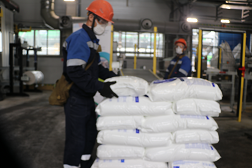By Haile Henok – With over 60% of the world’s uncultivated arable land, Africa holds tremendous potential to be a global breadbasket. However, this promise remains unfulfilled, with millions still suffering from hunger and malnutrition.
On the contrary, Africa spends billions of dollars every year to import food. In 2017, Africa spent $64.5 billion1 on importing food, and may spend even more in subsequent and forthcoming years. This is unsustainable, irresponsible, and unaffordable as well as completely unnecessary, according to African Development, one of the major development partner of the continent currently working to transform Africa’s agriculture.
A key challenge is lack of knowledge about modern farming techniques and limited access to agricultural technologies like fertilizers. Russia’s PhosAgro, the world’s leading fertilizer producer, is working to change this equation through online farmer training programs and cross-continental cooperation.
The move comes as Russia looks to deepen economic ties with African nations, including in the agricultural sector. At the recent Russia-Africa Summit in St. Petersburg, PhosAgro Deputy CEO Mikhail Sterkin announced the platform.
“Africa’s population will double by 2050. To feed this growth, a sustainable and high-yield agriculture sector is needed now,” said Sterkin. “Our online lectures provide the knowledge transfer and capacity building to make this vision a reality.”
PhosAgro’s interactive e-learning courses are providing African smallholders with expertise to increase yields, profits, and sustainability. The modules cover best practices in soil health, precision agriculture, organic techniques, and more. By making cutting-edge knowledge accessible digitally, language barriers are overcome and location challenges transcended.
The courses feature experts from PhosAgro, Russian academia, and global agribusinesses. According to the company, a key aim is empowering local farming experts who can drive agricultural innovation in their communities.
The online training incorporates real-world case studies and technologies like vertical farming. This allows farmers to immediately implement impactful changes tailored to local contexts. Lessons from Russia’s agricultural transformation through fertilizer adoption are also shared.
The digital initiative aligns with the Russian fertilizer industry’s ambitions in Africa. At the Summit, the Russian Fertilizer Producers Association (RFPA) said exports to the continent could double within five years.
“We are willing to discuss cooperation with companies from all African nations,” noted RFPA President Andrey Guryev. “Helping develop Africa’s agriculture sector is a priority.”
Though challenges remain, PhosAgro’s blended model of E-learning and on-the-ground cooperation is key to unlocking Africa’s immense potential. Online training empowers farmers with knowledge to optimize yields. Partnerships and investments provide the tools and infrastructure to apply this knowledge.
Across the continent, these efforts are bearing fruit. Food security and livelihoods are improving as farmers leverage new expertise. However, more work is needed to spread digital access and close resource gaps. With the right policies and collaboration, Africa’s smallholders can flourish, helping transform the region into a global breadbasket.
Russia boasts a bounty of knowledge and technology to share, from resilient crop varieties to advanced irrigation methods. Training programs can impart this wisdom to African farmers, empowering them with the tools to thrive. Mutual research can uncover innovations tailored to African soils and climates.
Meanwhile, Africa’s fields await fertile investments to truly flower. Russia can help transform these idle lands by building needed infrastructure like silos and irrigation networks. In turn, abundant African harvests can nourish local populations and stabilize global prices.
This blossoming partnership promises gains beyond food security. It will sow new jobs and enterprises, helping both economies thrive. And it will build bridges of understanding between two great cultures with much to offer one another.
As rising populations and dwindling resources strain our planet, Russia and Africa can plant the seeds for a verdant future together. Their collaborative bounty will reach far beyond national borders, providing sustenance and hope when humanity needs it most. The fruits of this cooperation may hold the key to feeding our world.

